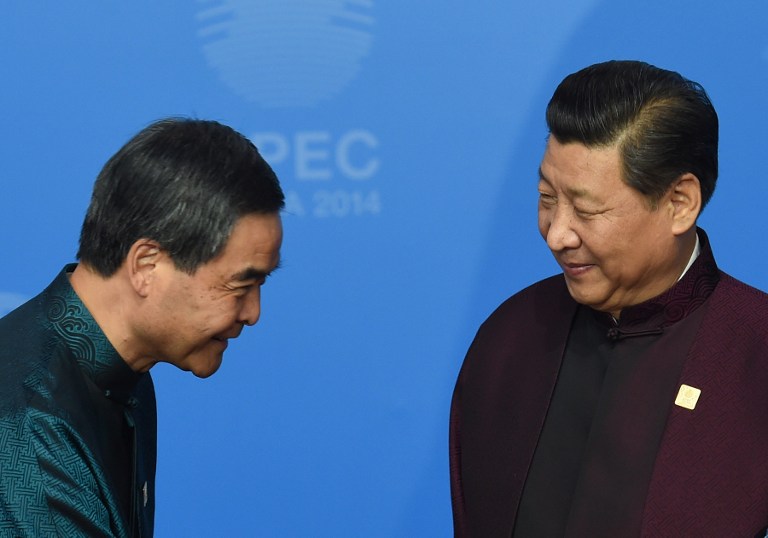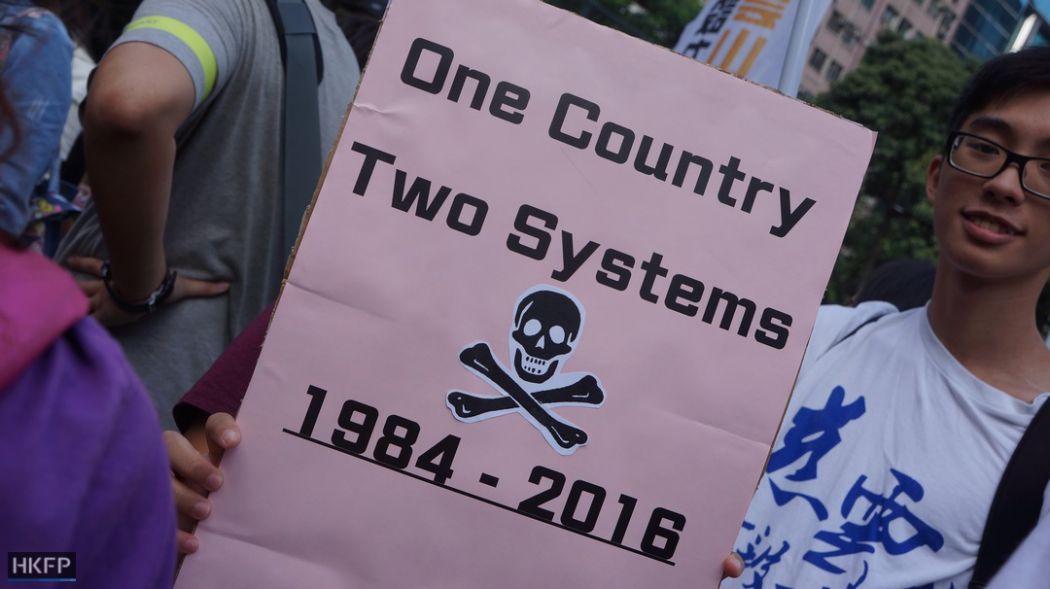Beijing has so far not handed down any more ultimatums on Hong Kong’s political way forward. Official lines have been drawn with the August 31, 2014 decision on political reform and the November 7, 2016 interpretation of Hong Kong’s Basic Law Article 104 on oath-taking.
But well-placed “sources” have been quite forthcoming on the current state of official Beijing deliberations about Hong Kong. In polite formal pro-Beijing discourse, this situation is caused by the stubborn dissenting “opposition.”

The end of Hong Kong’s long-drawn-out 2015-17 election cycle brought an upsurge of such commentaries. The suggestions all aim to break the deadlock on Beijing’s terms, without actually presenting them as official Beijing thinking. Presumably, they are meant to prepare public opinion for what seems likely to follow.
Punishments
The first order of business is already underway. This entails dealing with those who have done the most to precipitate the current stalemate.

The day after Carrie Lam’s March 26 selection for Chief Executive had been formalized, pending trials were announced for nine leaders and activists from the 2014 Occupy protest movement. Included are the three original Occupy Central founders who began organizing in 2013, and two current Legislative Councillors.
Additionally, fallout from the Occupy movement is now threatening to oust another eight newly-elected Occupy-generation Legislative Councillors, adding up to a total of ten. The eight are being prosecuted separately for various radical actions associated with the swearing-in ceremony last October.

Arrests are also ongoing for other transgressions. Besides possible disqualification over oath-taking, five of the legislators also face disruption offenses that carry possible prison terms.
On April 27, another nine activists were arrested as ringleaders of an unauthorized protest outside Beijing’s Liaison Office.
By the book
Still, it must be said that through it all Beijing has continued to play by the book … or rather the Basic Law. So now it’s possible to see what those upbeat pre-1997 slogans and Basic Law promises meant. And also what they did not mean.
The 20 years since 1997 when the British left have been well spent, the groundwork carefully laid. Hong Kong is now poised to begin making the final transition from one-country, two systems, to one-country-one-system.
If only it wasn’t for those hundreds of thousands of Hong Kongers who keep voting and marching and speaking a political language Beijing either does not understand or cannot accept.
So pro-Beijing surrogates and champions have begun, finally, using Beijing’s definitions to explain directly to the people of Hong Kong what the promises mean.
A new take on old promises
Zhou Bajun is often featured on the op-ed pages of pro-Beijing Hong Kong publications. He is a member of the Hong Kong government’s Commission on Strategic Development and an associate of Shanghai’s Academy of Social Sciences.
He elaborated recently on Hong Kongers’ errors. Zhou wrote that three misunderstandings have developed around the one-country, two-systems concept. First, Hong Kongers themselves and observers elsewhere have confused the design with the way it actually works in practice.

It was originally designed by Beijing to smooth the transition from British to Chinese rule by maintaining essentially the same political system before and after 1997. But at the last minute, the British changed the system. This they did by introducing more democratic elements.
The British didn’t begin to introduce one-person, one-vote direct elections in Hong Kong until the 1980s, after they learned they would be leaving in 1997. The 1990s speed-up was an afterthought following the collapse of communism in the Soviet Union and Eastern Europe.
Zhou claims the disruptive nature of Hong Kong’s “opposition camp” can be traced to the expectations created by those last-minute reforms. They sought to introduce “representative democracy” into the “existing political system”.
Zhou also blames the Americans for “expanding infiltration in Hong Kong” but offers no details on that point.

The second misunderstanding was to misconstrue the meaning of Hong Kong’s Basic Law Article 5. It promises that for 50 years from 1997, “the socialist system and policies shall not be practised” in Hong Kong and the “previous capitalist system and way of life shall remain unchanged.”
How could anything remain unchanged for 50 years, asks Zhou. Article 5 should not be interpreted to deny “the need to move with the times.” Nor should it be used to deny the need for economic integration.
What all that means now, explains Zhou, is Beijing’s one system for economic integration. But Hong Kong’s political system should not be allowed to obstruct the one system development.
A third misunderstanding concerns the matter of core values and the assumption that the 50-year guarantee was meant to include Hong Kong’s “core values introduced from the West.” Many Hong Kongers felt that holding on to those core values was a crucial part of the one-country, two-systems promise.
One essential value is missing from that assumption, namely, that “Hong Kong is an inseparable part of China.” Zhou thinks these three misunderstandings must be corrected if Hong Kong is to move forward along the correct path.
More reflections of Beijing’s thinking were provided by Lau Nai-keung, also a member of the Hong Kong government’s Commission on Strategic Development. He serves on the Beijing-appointed Basic Law Consultative Committee.

He startled reporters covering a Beijing seminar on Hong Kong last month with another of his trademark comments. Lau then elaborated for the benefit of readers back home.
Much had been made about Beijing officials lobbying on Carrie Lam’s behalf during the run-up to her final March 26 selection. Critics pointed to the Basic Law’s Article 22 that forbids such intervention, or at least everyone used to think it did.
Article 22 states specifically that “no department of the Central People’s Government … may interfere in the affairs which the Hong Kong Special Administration Region administers on its own in accordance with this Law.”
Lau Nai-keung agreed that officials had lobbied on her behalf. Article 22 of the Basic Law does say that mainland officials are not supposed to interfere in Hong Kong affairs. But Lau defined interference as something negative, “unwanted and counter-productive.”
Officials working in the Hong Kong Liaison Office were just doing their jobs. They were not violating Article 22 because their work was not unwanted or counter-productive.
Furthermore, Article 22 only refers to departments and local governments under the central government … not the central government itself, which the Liaison Office represents.

Liaison Office legal affairs chief Wang Zhenmin provided some official support for Lau’s argument. In a speech, Wang said Hong Kong’s young radicals were, in effect, challenging Beijing’s sovereignty as well as the nation’s security and its developmental progress.
Beijing is not interfering in Hong Kong but only exercising Beijing’s sovereign rights … just like the brain’s relationship to the body. One could not function without the other.
Beijing’s Hong Kong to-do list
The new elaborations by Zhou, Lau, and others are actually a welcome change. At least Beijing is no longer hiding behind the original deceptive dual-use language of the Basic Law. But now that Beijing is beginning to reveal its real intentions, how does it plan to bring Hong Kong’s voters and marchers into line? The main themes are clear.
First, clamp down hard on “separatists” of all kinds. Beijing does not distinguish between independence, self-determination, or autonomy. As all of Hong Kong’s main political groups have come out at least for self-determination, they are all on the hit list.
Second, pro-Beijing politicians are gearing up for the by-elections to follow the disqualification of Legislative Councillors. That will give loyalists a second chance to make the post-Occupy gains that eluded them last year.
Third is how best to use any such gains, but officials seem still to be debating among themselves. Carrie Lam says she wants to focus on livelihood issues and set aside contentious challenges like political reform.
Wang Zhenmin agrees. During a recent speech, he said that Hong Kong’s universal suffrage electoral reform project should be shelved for another 5-10 years. Best focus on economic development and livelihood issues.
But with or without political reform, loyalists are not trending toward conciliation. Instead, their thoughts are headed in the opposite direction: the need to revive Article 23 national security legislation.

One academic in Shenzhen has even promoted Article 23 legislation as a means of healing the rifts. He said the legislation would give Hong Kong authorities the legal means they do not now have to enforce compliance … a mainland perspective on overcoming political divisions.
Jasper Tsang Yok-sing puts it more diplomatically: Hong Kong should pass this legislation sooner rather than later, before Beijing loses patience and imposes something worse.
